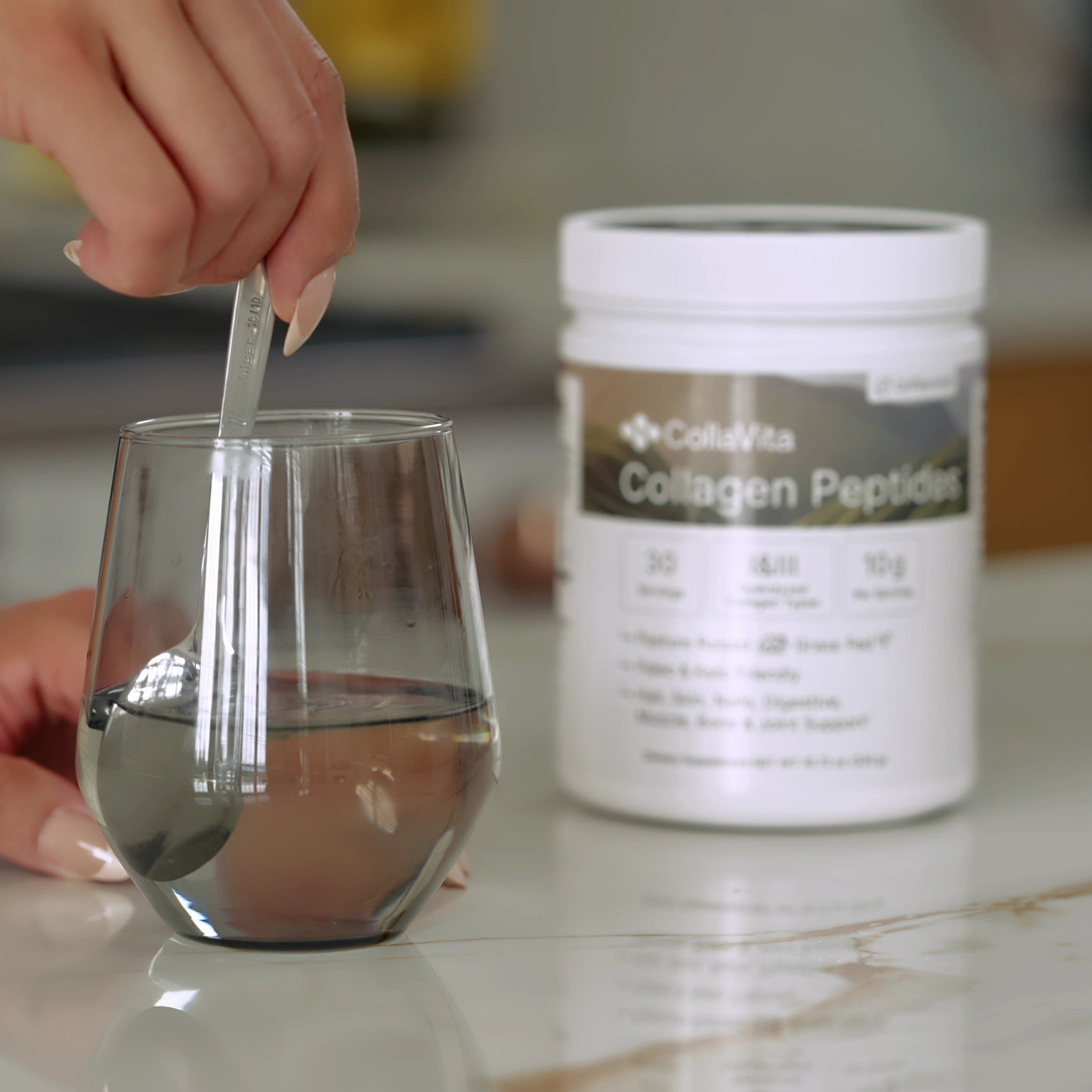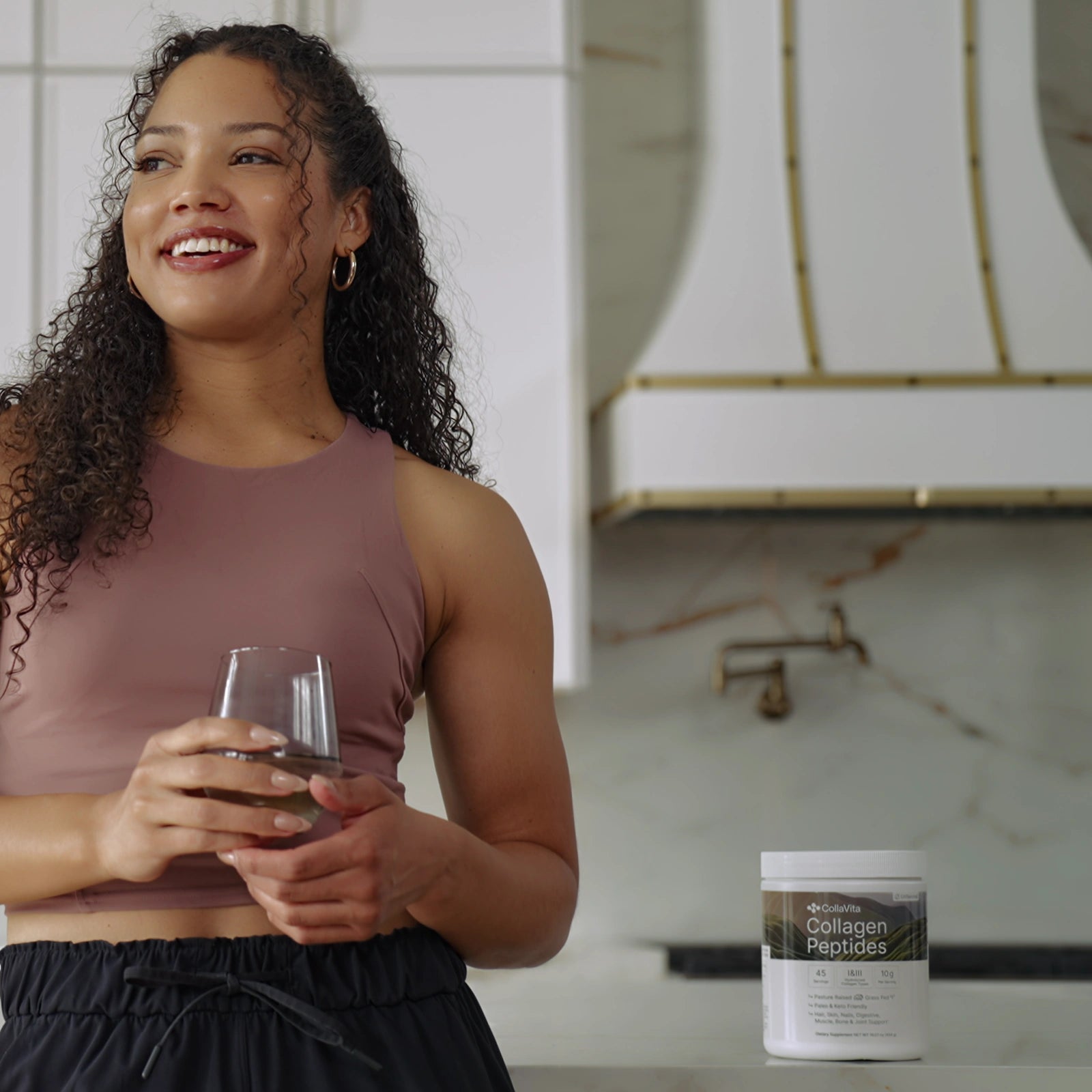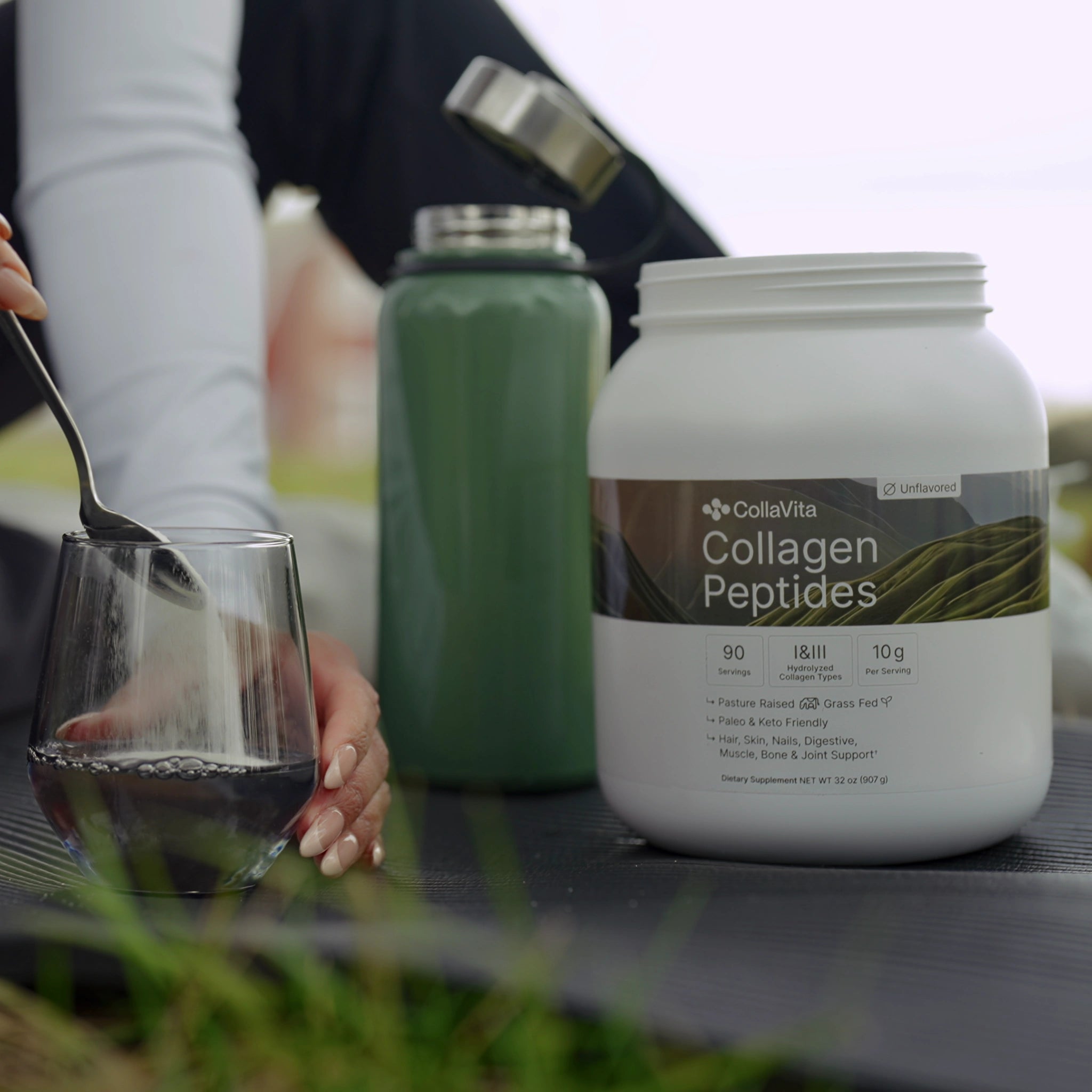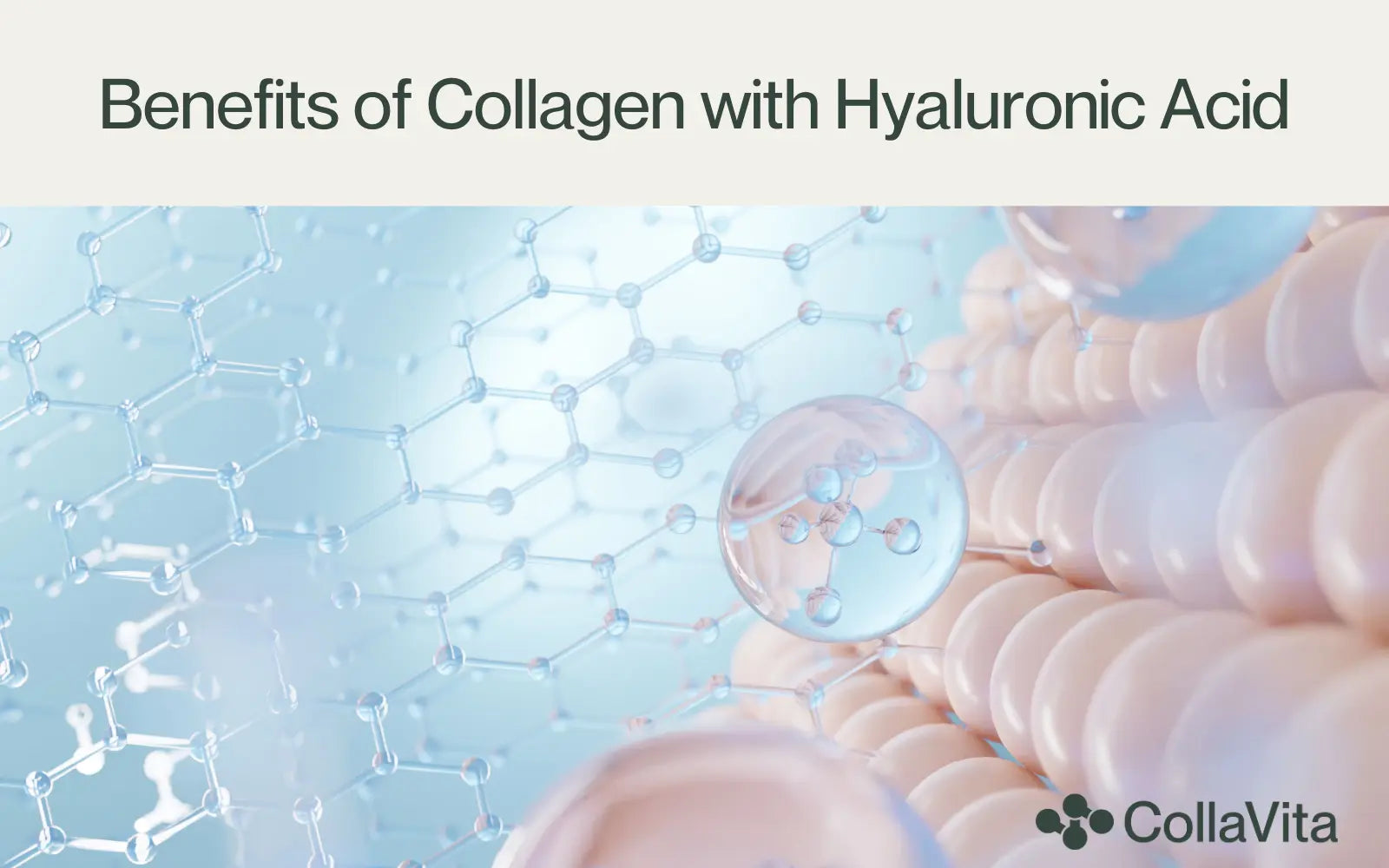What is Hydrolyzed Collagen?
Hydrolyzed collagen is made by breaking regular collagen into smaller chains of amino acids (called peptides) using heat or enzymes. These peptides are easier for your body to absorb in the gut and put to work where needed.
You can find it in powder, liquid, or capsule form—and it mixes easily into water, coffee, smoothies, or food.
There are different sources of hydrolyzed collagen:
- Bovine (cow) – mostly Types I & III, good for skin, bones, and hair
- Marine (fish) – mainly Type I, easy to absorb, great for skin
- Chicken – rich in Type II, supports joint health
A 2022 review in International Journal of Sport Nutrition and Exercise Metabolism(2) confirmed that 10–15 grams daily of collagen peptides supported joint function and recovery in active adults.
Hydrolyzed collagen (also called collagen peptides) goes through a multi-step process to become easier for our bodies to absorb. Here’s a simple breakdown of how it works:
1. Heating the Collagen (Denaturation):
The first step is heating collagen from animal sources (like bones or skin). Heat breaks the bonds in collagen’s triple-helix structure in a process called denaturation, turning it into gelatin—a gel-like substance. Different types of collagen respond differently to heat. For example, Type II collagen (mostly found in cartilage) may require higher heat than Type I or III, which are more common in skin and tendons.
2. Hydrolysis:
Hydrolysis is the process by which collagen peptides are broken into smaller fragments. There are two main ways to do this:
- Acidic Hydrolysis: Uses acids like hydrochloric acid to break the protein into smaller parts. It’s faster and cheaper but less controlled.
- Enzymatic Hydrolysis: Uses natural enzymes like pepsin, trypsin, or protease to gently break down collagen. This process is more expensive but preserves the bioactive parts better, making it ideal for supplements.
Zague et al., (Journal of Clinical and Aesthetic Dermatology, 2018) report(3) that enzymatic hydrolysis produces bioactive collagen peptides that can stimulate skin and joint health.
3. Processing and Purification:
After hydrolysis, the collagen solution is filtered and purified to remove anything not needed. Techniques like ultrafiltration and dialysis are used to remove salts, acids, or unwanted particles.
Then, the solution is dried using freeze-drying (lyophilization) or vacuum evaporation to make powders, granules, or capsules.
4. Regular Collagen vs. Hydrolyzed Collagen: Key Differences
Both regular collagen and hydrolyzed collagen come from the same sources, like bones, skin, or cartilage from animals or fish. But the way they're processed—and how your body absorbs them—makes a big difference.
Hydrolyzed collagen (collagen peptides) is collagen broken down into smaller pieces, making it easier for the body to absorb. This process helps it support skin health, hair, nails, and joint recovery more efficiently.
Regular collagen is unprocessed and larger, which makes it harder for the body to absorb. It’s best for joint health and gut support, but it works more slowly and requires smaller doses.
The table below details the differences between hydrolyzed collagen vs collagen peptides.
| Feature | Hydrolyzed Collagen | Regular Collagen |
|---|---|---|
| Molecular Structure | Smaller peptides (broken down by enzymes or acids) | Larger protein molecules |
| Absorption Rate | Faster absorption due to smaller size | Slower absorption compared to hydrolyzed collagen |
| Digestion | Easily digested by the body | May require more time to digest, especially when consumed in larger quantities |
| Usage | Can be added to various foods and beverages, suitable for daily supplementation | Often used in cooking and culinary applications |
| Ideal Use Cases | Skin health, hair, nails, overall well-being, quick results | Joint health, gut health, gradual improvements |
| Benefits | Improved skin elasticity, reduced wrinkles, enhanced nail strength, supports muscle recovery | May support joint lubrication and gut health, and provide a steady supply of amino acids |
| Considerations | May be more expensive, potential for allergies | May require more preparation time and may not be as versatile |
How to Choose the Best Hydrolyzed Collagen Supplement?
Here are the 4 considerations that should guide your selection of a hydrolyzed collagen supplement.
1.Ingredient
Collagen supplements typically come from animal sources such as bovine (cow), marine (fish), chicken, or porcine (pig) collagen. Plant-based options do not contain collagen but may include ingredients that support the body’s natural collagen production. When choosing a hydrolyzed collagen supplement, products with no or as few additives (such as colorants, artificial flavors, and preservatives) should be preferred. If you choose marine collagen, opt for wild-caught fish as it tends to be safer and more natural than farmed fish. For bovine or chicken collagen, look for products from grass-fed or free-range animals for higher quality and bioavailability.
2.Transparency
A high-quality collagen supplement will be transparent about its ingredients and production process. Ensure that the product label clearly lists all ingredients, including additives, and that the company follows high manufacturing standards and quality control procedures.
3.Certifications
Look for certifications like ISO or third-party testing to ensure the product meets manufacturing standards and is safe. Trusted certifications show that the product has undergone rigorous testing for quality and safety.
4.Peptide Concentration
Peptide concentration (the amount of amino acid chains from collagen) is crucial for absorption and effectiveness. Higher peptide concentrations often result in better absorption and more noticeable benefits. 5–10 grams per serving is typically effective, but it may vary depending on the brand.
What are the Benefits of Hydrolyzed Collagen?
Hydrolyzed collagen offers several benefits, thanks to its ability to be absorbed quickly by the body. Here are five key benefits supported by research:
1. Skin Health
Hydrolyzed collagen helps restore skin hydration and elasticity. A study published in the Journal of Medicine(4) found that after 8 weeks, women who took hydrolyzed collagen saw a noticeable reduction in wrinkles (Journal of Medicine, 2019)
2. Joint Health
Hydrolyzed collagen, especially from chicken (Type II collagen), can help reduce joint pain and improve function. Athletes often use it to support joint recovery and mobility.
3. Stress Management
When stressed, the body uses glycine, an amino acid found in collagen. Taking hydrolyzed collagen may help replenish glycine stores and support overall stress management.
4. Sleep Support
Collagen is rich in glycine, which may help promote better sleep by supporting relaxation, and calmness.
5. Gut Health
Emerging research suggests collagen might support gut lining health, but more studies are needed.

Other Potential Benefits of Hydrolyzed Collagen
In addition to the benefits mentioned above, hydrolyzed collagen may help with:
- Hair health and potentially preventing hair graying.
- Weight loss support by preserving lean muscle mass.
- Wound healing, as collagen plays a key role in tissue repair.
- Heart health, by supporting the blood vessels and reducing damage from oxidative stress.
Collagen supplements are best known for helping skin elasticity and joint health, especially in older adults and athletes. Some early studies also suggest they may help strengthen nails and support hair appearance. Collagen contains the amino acid glycine, which may promote calmness or better sleep—but more research is needed. Always choose high-quality, well-studied supplements and consult a healthcare professional for your specific needs.
What are the Sources of Hydrolyzed Collagen?
Animal sources, such as poultry cattle, generate hydrolyzed collagen, just like conventional collagen. However, as the hydrolysis process requires heat treatment, the stability values of the generated collagen could vary. Now we see that collagen from chicken and cow, among other animals, has relatively higher stability values than marine collagen, which is lower.
What is The Recommended Daily Dosage of Hydrolyzed Collagen?
The ideal daily dose of hydrolyzed collagen can vary based on your health goals. Here's what research shows:
- Minimum effective dose:
Studies suggest 2.5 to 10 grams per day of hydrolyzed collagen may help improve skin elasticity, hydration, and joint pain over time.-
Proksch et al., Skin Pharmacology and Physiology, 2014 showed that 2.5g/day improved skin elasticity after 8 weeks.
-
Clark et al., Current Medical Research and Opinion, 2008 reported that 10g/day helped reduce joint pain in athletes after 24 weeks.
-
- Higher doses (10–20g/day) may be used by athletes or those seeking muscle recovery or broader connective tissue support. However, more isn’t always better—your body only uses what it needs.
- Safety: Collagen supplements are generally safe for healthy adults. Any excess is broken down and excreted by the body. There are no major side effects at typical dosages in studies.
How Long Until Collagen Works?
- For skin health: Visible changes (like improved hydration or reduced wrinkles) may appear after 8 to 12 weeks. (Zague et al., 2018)
- For joint health: Relief may take longer—3 to 6 months, depending on the individual and severity. (Clark et al., 2008)
If you don’t see results after a few months, it could be due to the type, dose, or formulation of collagen. Check the ingredient label and look for clinical studies or certifications for quality assurance.
Final Tip:
Read product labels closely and choose a hydrolyzed collagen supplement with a clear dosage (5–10g per serving) and no unnecessary fillers. Individual needs vary, so consistency and quality matter more than taking the highest dose.
SOURCES
(1)- Jin, C.H.; So, Y.; Kim, H.-Y.; Han, S.N.; Kim, J.-B. Anti-Arthritic Activities of Supercritical Carbon Dioxide Extract Derived from Radiation Mutant Perilla Frutescens Var. Crispa in Collagen Antibody-Induced Arthritis. Nutrients 2019, 11, 2959.
(2)- Clifford, T., et al. (2022). Int J Sport Nutr Exerc Metab, 32(5), 280–289.
(3, 4)- Zague, V.; et al. Evaluation of the Efficacy of a Hydrolyzed Collagen Supplement for Improving Skin Properties. J. Clin. Aesthet. Dermatol. 2018, 11, 1–8.
Scientifically Reviwed by Omer (Matt) Sermet

















